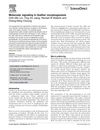172 citations,
March 2019 in “The EMBO Journal” FERONIA and LRX proteins help control cell growth in plants by regulating vacuole expansion.
 11 citations,
July 2012 in “Current Opinion in Pediatrics”
11 citations,
July 2012 in “Current Opinion in Pediatrics” Skin problems can be signs of hormone-related disorders and recognizing them early is important for treatment.
 6 citations,
September 2007 in “PubMed”
6 citations,
September 2007 in “PubMed” Stem cell niches regulate the number and function of stem cells in the body.
 5 citations,
January 2018
5 citations,
January 2018 The conclusion is that a new test was created to find substances that affect specific ion channels, and it works well for drug discovery.
 3 citations,
March 2011 in “Informa Healthcare eBooks”
3 citations,
March 2011 in “Informa Healthcare eBooks” Acne in children varies by age and severity, requires a pediatric treatment approach, and may need diagnostic evaluation for underlying conditions.
 2 citations,
July 2017 in “IEEE Photonics Journal”
2 citations,
July 2017 in “IEEE Photonics Journal” The study found that combining SHG and OCT effectively monitors skin wound healing in mice.
 January 2018 in “bioRxiv (Cold Spring Harbor Laboratory)”
January 2018 in “bioRxiv (Cold Spring Harbor Laboratory)” Auxin helps root hairs grow in high phosphate by affecting ROS and involving RSL2 and RSL4.
 July 2023 in “The Egyptian Journal of Hospital Medicine ”
July 2023 in “The Egyptian Journal of Hospital Medicine ” Alopecia areata is a hair loss condition caused by immune factors and can be treated with JAK inhibitors.
 3 citations,
January 2024 in “Signal transduction and targeted therapy”
3 citations,
January 2024 in “Signal transduction and targeted therapy” Lymphatic vessels are essential for health and can be targeted to treat various diseases.
 6 citations,
July 2022 in “Biomedical Signal Processing and Control”
6 citations,
July 2022 in “Biomedical Signal Processing and Control” The new hair removal algorithm for skin images works better for detecting and fixing hair, improving melanoma diagnosis.
6 citations,
June 2016 in “Journal of receptor and signal transduction research” Minoxidil increases calcium levels and kills prostate cancer cells independently of calcium.
 5 citations,
February 2019 in “The New England Journal of Medicine”
5 citations,
February 2019 in “The New England Journal of Medicine” Certain mutations in the PADI3 gene may increase the risk of developing a type of scarring hair loss common in women of African descent.
 199 citations,
April 2010 in “Nature”
199 citations,
April 2010 in “Nature” A gene called APCDD1, which controls hair growth, is found to be faulty in a type of hair loss called hereditary hypotrichosis simplex.
 160 citations,
January 2017 in “Development”
160 citations,
January 2017 in “Development” Blood vessels and specific genes help turn cartilage into bone when bones heal.
 138 citations,
March 2001 in “Clinics in Dermatology”
138 citations,
March 2001 in “Clinics in Dermatology” Hair loss can significantly affect a person's self-esteem and body image, especially in young people, those who value their looks highly, and women.
 22 citations,
April 2020 in “Scientific reports”
22 citations,
April 2020 in “Scientific reports” Changthangi goats have specific genes that help produce Pashmina wool.
 5 citations,
June 2015 in “Journal of dermatology”
5 citations,
June 2015 in “Journal of dermatology” A woman and her daughter had thallium poisoning from a herbal drink and rodenticide, causing hair loss and other symptoms.
 2 citations,
January 2020 in “Journal of Experimental Social Psychology”
2 citations,
January 2020 in “Journal of Experimental Social Psychology” Baldness and shaved heads change how traits are seen but don't really affect leader preferences.
 1 citations,
January 2017 in “Springer eBooks”
1 citations,
January 2017 in “Springer eBooks” Flavonoids and Nod factors are key for legume plant growth and could help in sustainable farming.
 May 2021 in “Journal of the Endocrine Society”
May 2021 in “Journal of the Endocrine Society” A woman's severe hormone imbalance after menopause led to finding a rare ovarian tumor, treated by surgery.
 November 2013 in “John Wiley & Sons, Ltd eBooks”
November 2013 in “John Wiley & Sons, Ltd eBooks” Skin symptoms can indicate endocrine disorders and have various treatments.
 January 2010 in “Actas Dermo-Sifiliográficas”
January 2010 in “Actas Dermo-Sifiliográficas” A woman was allergic to quinine in her anti-hair loss lotion.
 231 citations,
July 2008 in “Nutrition reviews”
231 citations,
July 2008 in “Nutrition reviews” Diet changes can protect against harmful environmental effects on fetal development.
 193 citations,
February 2015 in “Nature Communications”
193 citations,
February 2015 in “Nature Communications” Fungi-produced compounds can change plant root growth.
 119 citations,
January 2014 in “Indian Journal of Dermatology, Venereology and Leprology”
119 citations,
January 2014 in “Indian Journal of Dermatology, Venereology and Leprology” Platelet-rich plasma might help with hair growth and skin conditions, but more research is needed to prove its effectiveness and safety.
 109 citations,
January 2011 in “Frontiers in Systems Neuroscience”
109 citations,
January 2011 in “Frontiers in Systems Neuroscience” Choosing the right model order in brain connectivity analysis can affect the detection of differences between healthy individuals and those with seasonal affective disorder.
 85 citations,
October 2006 in “Current opinion in cell biology”
85 citations,
October 2006 in “Current opinion in cell biology” Feather growth and regeneration involve complex patterns, stem cells, and evolutionary insights.
 78 citations,
June 2005 in “Annals of oncology”
78 citations,
June 2005 in “Annals of oncology” Cetuximab can cause excessive eyelash growth.
 71 citations,
January 2015 in “The Scientific World Journal”
71 citations,
January 2015 in “The Scientific World Journal” Insulin resistance may contribute to various skin diseases and treating it could improve skin health and prevent more serious conditions.
 51 citations,
November 2011 in “British Journal of Dermatology”
51 citations,
November 2011 in “British Journal of Dermatology” A gene called HDAC9 might be a new factor in male-pattern baldness.



























